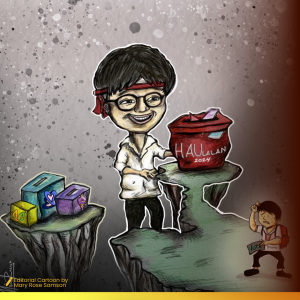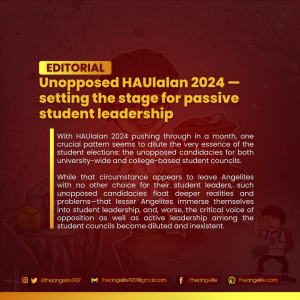
 With HAUlalan 2024 pushing through in a month, one crucial pattern seems to dilute the very essence of the student elections: the unopposed candidacies for both university-wide and college-based student councils.
With HAUlalan 2024 pushing through in a month, one crucial pattern seems to dilute the very essence of the student elections: the unopposed candidacies for both university-wide and college-based student councils.
While that circumstance appears to leave Angelites with no other choice for their student leaders, such unopposed candidacies float deeper realities and problems—that lesser Angelites immerse themselves into student leadership, and, worse, the critical voice of opposition as well as active leadership among the student councils become diluted and inexistent.
In the recently released unofficial list of candidates by the University Student Elections Commission (USEC), there is no contest all the way from the heads of the University Student Council (USC), namely, the president, and vice presidents, both internal and external—leaving Angelites with a lone ballot checkmark in these crucial positions.
Senators from each college are also unopposed, with only the School of Nursing and Allied Medical Sciences (SNAMS) having a match-up for the upcoming elections.
This, in fact, changes the whole point of an election—which is to choose and vote for students of different political parties into positions to represent the student body. Thinning out the variety of student leaders in political parties would force Angelites to limit their options in choosing competent student leaders of their choice, limiting the radical voice needed for an election to truly progress.
If there is one fact that arises from such elections, having only one ruling party take almost all the positions means concentrating power only in a circle of student leaders, potentially leading to decisions that do not truly reflect the needs of the whole student body but only themselves.
Take it from the bigger national government itself—with a supermajority coming from the same political party. Checks and balances become less operative, and the institutionalization of faulty policies becomes an entrenched norm. With the student councils being microcosms of the national government, it is important to realize that such unopposed elections bring more peril than benefit to the whole student body.
Considering the situation, some might fault previous student leaders for making student politics uninteresting and superficial.
However, this circumstance should be a callout, most especially to the USEC and the school administration, to change the current course and policies that allow such a lack of competition in the most vital positions to be unopposed. They should realize that there is the need to address the ever-changing political landscape within the university, and ensure active student involvement in decisions, such as in the implementation of HAUlalan.
Through this, Angelites get to be more politically and socially active in shaping the university’s political scene. Consequently, those who will sit as student leaders are those who will serve with genuine competence; who will go above and beyond in serving the student body by bridging the gap between the studentry and the social realities that impact not just us, but also the wider community.
Should the current trend continue as the status quo for more elections, the diminishing choices of student leaders for HAUlalan 2024 will set a precedent for a jeopardized and ineffective student leadership in the upcoming term, and in the future.
Instead, crucial efforts, from aspiring student leaders, up to those who set the policy of student elections, must be made in making certain that the very core of student democracy lives up—drawing lifeblood from adequate, dynamic, and true representation of the Angelite student body.
